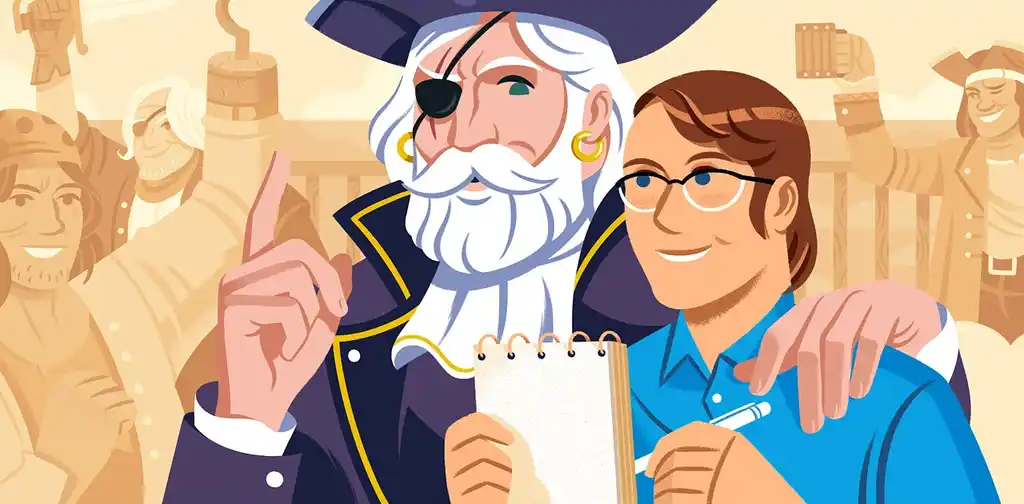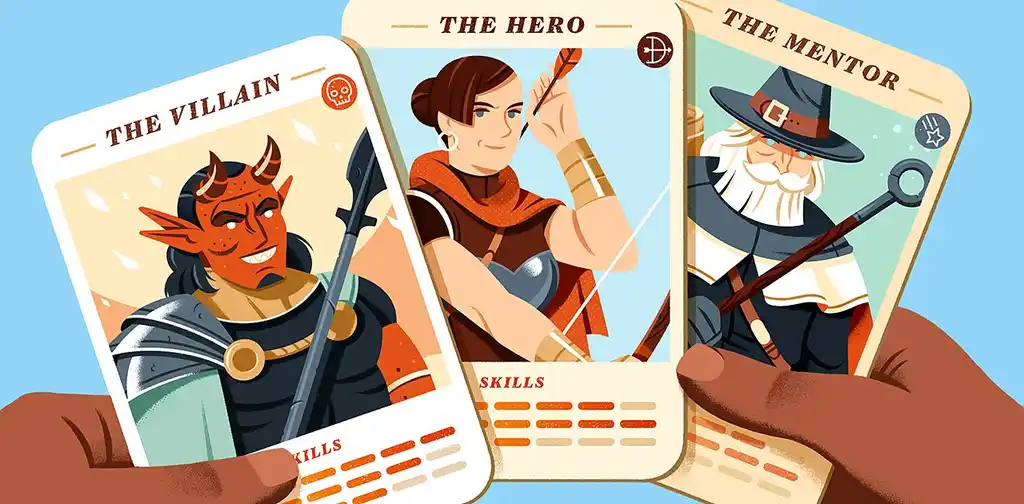Last updated on Oct 14, 2025
What is the Proust Questionnaire? 22 Questions to Write Better Characters
Isabella Peralta
A writer and editor, Isabella coordinates "Prompts," Reedsy's weekly short story competition. Originally from the Philippines, she is a graduate of the University of Cambridge.
View profile →Whether you’re interviewing someone for a biography or trying to bring a fictional character to life, you’ll need strong questions to help you get to know them better.
In this post, we’ll be looking at a set of questions that’s been steadily growing in popularity over the years: the Proust Questionnaire.
A Short History
The Proust Questionnaire is a set of questions whose origins can be traced back to the late 1800s. Although French writer Marcel Proust popularized the questionnaire, the actual creator’s identity remains unknown.
What we do know is that Proust first filled out the printed questionnaire by hand in 1886 — when he was around 14 years old — and his answers were published two years after his death at the age of 51 in the French literary journal Les Cahiers du Mois.
Over the decades, several TV hosts and publications such as Vanity Fair have used modified versions of the questionnaire — now commonly referred to as the Proust Questionnaire — to interview famous figures, including Margaret Atwood, Aretha Franklin, and Antonio Banderas, giving fans a more multifaceted picture of their favorite celebrities.
While these questions were initially created as a fun distraction for friends and family members to answer, they can be a valuable resource for writers who need help with creating a cast of varied characters.

FREE RESOURCE
Reedsy’s Character Questionnaire
40 questions to help you develop memorable characters.
The Proust Questionnaire: 22 Questions
To make the most of this questionnaire, put yourself in your character’s shoes and answer from their perspective. This may appear easy enough at first, but keep an open mind. You’ll likely unearth certain details and facts that you weren’t previously aware of.
Ready to start answering some deep questions? Let’s begin!
1. What is your favorite virtue?
There’s a famous saying that goes, “Patience is a virtue.” If your character isn’t the most patient person in the world, there’s bound to be at least one virtue they hold in high regard. Maybe they value authenticity, compassion, courage, creativity, graciousness, or loyalty? Think about what your character would view as more important or favorable than the rest, and remember: characters don’t always practice what they preach.
Notable answer: “All virtues that are not limited to a sect: the universal virtues.” — Proust
2. What are your favorite qualities in a man?
There are different ways to approach this question. For example, if you’re writing a love story, think about some qualities that your character would want to see if they’re looking for a romantic partner. Meanwhile, if you’re working on an epic family saga, what are some qualities that your character would want their fathers and uncles to have?
Notable answer: “The ability to return books.” — David Bowie, Vanity Fair
3. What are your favorite qualities in a woman?
Similar to the previous question, this one can be approached in several ways. Consider the different women in your character's life — what would they want from their female friends, for example, as opposed to their aunties? Also, what does their answer say about their views on women in general?
Notable answer: “A woman who knows she's capable of doing anything.” — Malala Yousafzai, Vanity Fair
4. What is your favorite occupation?
If your character had to choose one thing to occupy their time with, what would it be? Do they have any particular hobbies they excel at, or do they love learning new things in their free time? If someone’s favorite occupation is a world away from their reality, what does that say about their satisfaction in life?
Notable answer: “What I’m doing now — being a storyteller.” — Michelle Yeoh, Vanity Fair

FREE RESOURCE
Reedsy’s Character Profile Template
A story is only as strong as its characters. Fill this out to develop yours.
5. What is your chief characteristic?
If your character were asked about their defining trait, what would it be? The answer to this question can reveal a lot about your character. How they see themselves will say a lot about whether they're self-aware or delusional, deep or superficial, and humble or overconfident.
Notable answer: “Inordinate self-esteem.” — Oscar Wilde, Mental Photographs
6. What is your idea of happiness?
Is happiness something that your character feels every day, or something they strive for? What in this world brings them the most joy? (If you want to go one step further, think about what your character’s perfect day would look like.)
Notable answer: “Everybody around me is happy, my spirit is right, and just nothing but peace and tranquility in the building.” — Snoop Dogg, Vanity Fair
7. What is your idea of misery?
What does misery mean to your character? Is it something they see all around them, a state of being that can be eradicated with positive thinking, or do they believe their own misery to be unique? Consider a certain scenario or situation that they’d never want to find themselves in. What would it mean for them to hit rock bottom? (And if you want to go one step further like with the previous question, imagine how the worst day of your character’s life would go.)
Notable answer: “Picking up dog poop.” ― Rita Moreno, Vanity Fair

8. What is your favorite color and flower?
Some might see this as an arbitrary question, but take some time to work on this one. Find out what different colors and flowers symbolize and see if that fits in with your character’s worldview. If they have a cheerful disposition, perhaps they love yellow and sunflowers, which both represent happiness, loyalty, and energy.
You can also choose some unexpected colors and flowers. For example, your seemingly bubbly and extroverted character might actually be calm and quiet at home and possess a fondness for lavenders and sky blue wallpaper.
Notable answer: “Quite impartial.” — Arthur Conan Doyle, untitled questionnaire (1899)
9. If not yourself, who would you be?
The answer to this question can help you think more deeply about your character’s aspirations, and disappointment at the qualities they lack. Are they happy with who they are, or would they choose to be someone they admire or envy? And what about that person does your character want for themselves? Fame? Wealth? Power? Love?
Notable answer: “I don’t need anyone else’s baggage.” — Ian Walsh, Red Bull
10. Where would you like to live?
Is your character perfectly happy with where they currently are, or do they wish to live elsewhere? To make it easier, think about polar opposites when you start answering this question. For example, if your character lives in a small, sleepy suburb, do they secretly dream of being in a vibrant, sprawling city? If they’re unhappy living at home with their family, do they want to pursue their dream career abroad? The possibilities are endless! Help your character find their happy place, and see what that unlocks for you.
Notable answer: “In the penthouse of Le Bristol Paris.” — Bill Nighy, Vanity Fair

11. Who are your favorite prose authors?
You can tell a lot about a person based on what they read. Whose writing does your character admire the most? The author of a high fantasy series where both the rich and the poor fight to the death to ascend the throne? A novelist who specializes in lighthearted beach reads and holiday romances? How about a writer obsessed with penning murder mysteries inspired by true events? In answering this question, also think about form — someone who prefers the direct prose of Hemingway might not be the same sort of person who enjoys being taken on lexicographic flights of fancy.
Notable answer: “I find it an impossible question. Like choosing between children.” — Zadie Smith, Vanity Fair
🖊️
Which famous author do you write like?
Find out which literary luminary is your stylistic soulmate. Takes one minute!
12. Who are your favorite poets?
Similar to the previous question, this one asks about your character’s favorite writers — but this time, for poetry. If your character isn’t the biggest poetry fan, don’t fret! The fact that they don’t have favorite poets says something just as profound. Perhaps they’re a no-nonsense person who can’t stand pretty passages and frivolity, or maybe they were never given the opportunity to understand and appreciate the joys of poetry.
Notable answer: “Baudelaire and Alfred de Vigny.” — Proust
13. Who are your favorite painters and composers?
Feel free to amend this question based on your story’s setting. If your character’s living in the 21st century, for example, they might have a favorite visual artist or pop singer instead. Meanwhile, a Patrarvian cadet from the Zebulon Galaxy might be partial to glablorx music — but what about that particular sci-fi genre do they like? Remember that a person’s taste in art and music (or lack thereof) can speak volumes about the kind of person they are.
Notable answer: “Illustrators of children’s books. Film composers have transported me to other worlds.” — Elizabeth Ross, OneFour KidLit

FREE COURSE
How to Develop Characters
In 10 days, learn to develop complex characters readers will love.
14. Who are your favorite heroes and heroines in real life?
These can be people your character has met in person or people they’ve heard about. Does your character want to become like them one day? What about these people does your character admire and respect?
Notable answer: “Teachers especially, or anyone who lifts others up. Mister Rogers!” — Yo-Yo Ma, Vanity Fair
15. Who are your favorite heroes and heroines in fiction?
Which heroic fictional figures does your character think highly of? How did your character first hear about these people, and why do they consider them to be their favorites? These days, we might immediately think of superheroes. Those are perfectly legitimate choices, just consider what underlying qualities they have that make them admirable — not just something surface level like, “They can stretch their bodies really far.”
Notable answer: “Robert Parker’s private detective Spenser, named after the poet. I like his philosophical approach to his cases that focus on the characters’ psychology.” — Kareem Abdul-Jabbar, Vanity Fair
16. What is your favorite food and drink?
For your answer to this question, think about food and drink as more than just fuel to sustain us. You can tell a lot about a person based on what they like to consume, from their cultural background and age to their socioeconomic status. Consider how you can show your readers certain details about your character based on what they love eating for breakfast, ordering at restaurants, picking up from their local grocery store, and more.
Notable answer: “Oysters and dry martinis.” — Jessa Crispin, The Chicago Blog

17. What are your favorite names?
Instead of thinking about names that look or sound nice, consider the deeper meaning behind each name as you tackle this question. Is one of your character’s favorite names the name of their deceased family pet? Or a beloved grandmother who they were almost named after?
Also consider looking up the origins of their favorite names to subtly hint at their personality. For example, a character who likes the name Jaikara — which means “victory comes to me” and is Indian in origin — might be someone obsessed with the idea of success and always coming out on top.
Notable answer: “I like ones with a place name as the given name: Indiana Jones, Minnesota Fats, Shanghai Lily. That said, it’s hard to beat ‘Big Bill Broonzy.’” — Kazuo Ishiguro, Vanity Fair
18. What is your pet peeve?
These minor annoyances can range from loud chewing and texting during a meal to slow driving and tardiness. Given your character’s personality, what’s something they find incredibly irritating that many people don’t seem to be bothered by? If your character is organized and punctual, do they hate it when other people make a mess of their things and waste their time? If your character is quiet and reserved, do they get riled up over-talkative people at the cinema?
Notable answer: “Slow-walking tourists on the sidewalk in front of me, three abreast, cow-faced, pointing at the sights.” — Colson Whitehead, Vanity Fair

19. What characters in history do you most dislike?
Which historical figures make your character’s blood boil? It could be a manipulative tyrant who once ruled over their home country, or perhaps it’s an arrogant inventor who stole others’ ideas and claimed them as their own. Or is your character a peace-loving creature who refuses to say that they detest anyone?
Notable answer: “Hitler, Franco, Pinochet.” — Annie Ernaux, The Delhi Walla
20. What is your present state of mind?
Although this question asks specifically about the present, one’s state of mind is often governed by thoughts of the past and future. One who thinks often of the past might live in regret or denial of what’s to come, while someone who’s constantly looking to the future might be restless or anxious. Those rare individuals who live day-by-day and manage to focus on the present? Well, bully for them!
Notable answer: “I miss my youth.” — Pedro Almodóvar, Vanity Fair
21. For what fault do you have the most tolerance?
In some ways, this is a test of patience for your character. What’s a personal shortcoming that your character doesn’t seem to mind? Oftentimes, these tolerated faults are ones that they might have experience of — or empathy for due to some life experience. Someone who has encountered addiction, for example, might be more likely to tolerate alcoholics than a well-meaning teetotaler.
Notable answer: “As I age I have become more tolerant of youth and the many delusions common to that demographic.” — Don McLellan, Open Book Toronto
22. What is your favorite motto?
What a challenge to find a phrase that encapsulates your character’s ideals or beliefs! If you’re looking for inspiration, some famous (read: overused) mottos include:
- “When life gives you lemons, make lemonade.”
- “Be the change you wish to see in the world.”
- “Don't sweat the small stuff.”
- “What's meant to be will always find a way.”
- “Everything in life that matters requires risk.”
- “This too shall pass.”
As an exercise, reflect on those examples we’ve just given. Which motto would be perfect for a character who is brave and adventurous? How about one who goes with the flow? One who wants to make a meaningful impact on others? One who believes in fate or destiny? There’s a reason why this question is at the end of the questionnaire — it might be the key to unlocking your character’s innermost drive.
Notable answer: “If it scares you, say yes!” — Hugh Jackman, Vanity Fair
And there you have it — 22 questions to help you develop more multifaceted characters! If reading this post has inspired you to think more deeply about character creation, here are a few extra resources for you to check out:
- Keep the momentum going by answering more questionnaires — we’ve got a post with 100+ revealing character questions just for you.
- See how knowledgeable you are about characters with our post on the 12 types of characters every writer should know.
- Unsure of whether your characters’ traits and habits are too cliché? Take a look at our comprehensive post on 150+ useful character quirks.







